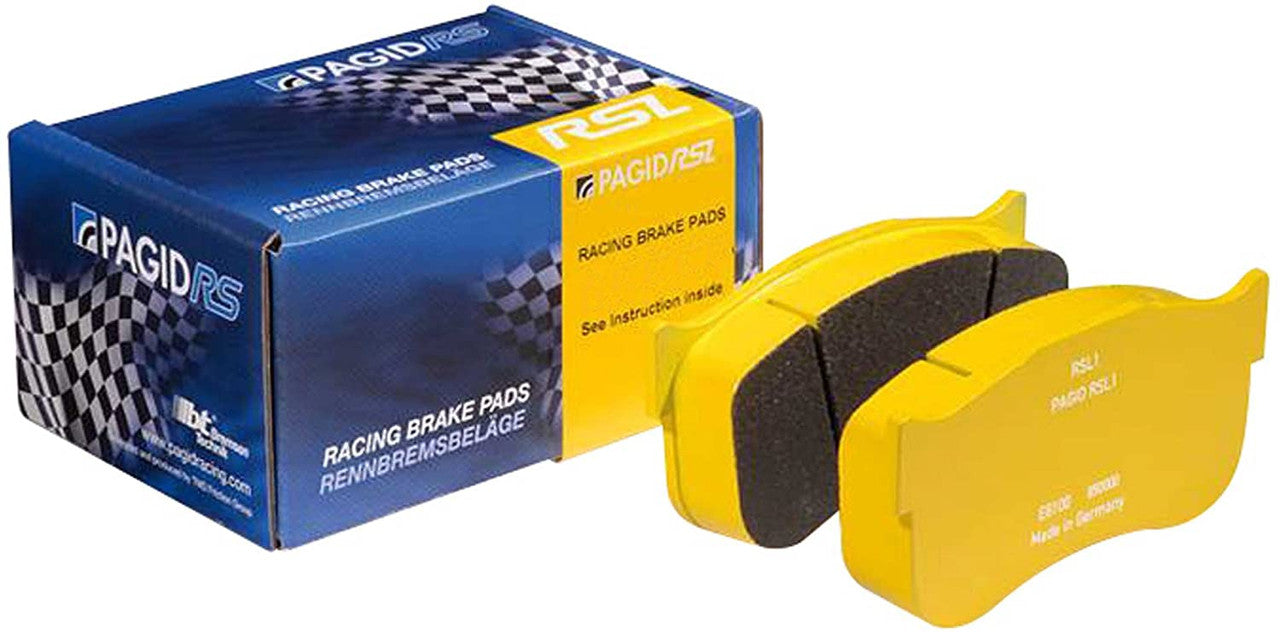Pagid Racing Brake Pads (6R)
GT cars, Touring cars for club racing and track days.
RS 14 features good all-around characteristics for many applications. It is a low metallic resin-bonded material containing steel and acrylic fibers.
RS4-2
Classic rally pad and is also very popular in small formula and touring cars.
RS 42 is a low metallic resin-bonded material containing steel and acrylic fibers. The characteristics make this material appropriate for small formula cars.
RS4-4
Very good rear axle pad for all front-engine cars. Very popular club racing compound.
RS 44 works for formula cars all the way up to lighter passenger cars. It is a low metallic resin-bonded material containing steel and acrylic fibers. The smooth progression of friction from cold to hot makes this material easy to work with.
Pagid RSL - Endurance Brake Pads
RSL1
Used in GT cars, Touring cars, and prototype endurance racing. Due to the high friction and good modulation, often used in sprint races as well.
RSL 1 is a low metallic resin-bonded material containing steel and acrylic fibers. It maintains a constant friction level over a wide range of temperatures. Its low wear rate and disc friendliness make this material appropriate for endurance races.
RSL2
GT cars, Touring cars, and prototype endurance racing. Due to excellent modulation characteristics often also used in sprint races.
RSL 2 is based on the RSL 1 compound but has been further improved in terms of the pad and disc life as well as friction stability vs. temperature.
It is a low metallic resin-bonded material containing steel and acrylic fibers. Furthermore, it maintains a constant friction level over a wide range of temperatures.
RSL19
Rear axle usage in combination with RSL 1 and RSL 2 on the front axle in heavier cars (GT3/GTE). Front axle usage for lighter GT and Touring cars.??????
RSL 19 is a low metallic resin-bonded material containing steel and acrylic fibers.
It maintains a constant friction level across a broad range of temperatures. The material features very good modulation and release characteristic
RSL29
Very popular in club racing and track days. GT cars, Touring cars, and prototype endurance racing. Due to excellent modulation characteristics also often used in sprint races.
RSL 29 features very good modulation and release characteristics. It is a low metallic resin-bonded material containing steel and acrylic fibers.
The friction level of the material maintains constant at a low-medium level. Another advantage is the easy bedding in behavior.
Pagid RST - Rally, Sprint, and Stock Car Racing Brake Pads
RST1
Rally tarmac, GT cars and Touring cars circuit racing (sprint), high down-force formula cars, NASCAR. Suitable for applications in heavy cars and where high torque is necessary against small-diameter rotors.
RST 1 has a very high friction level and high-temperature resistance. It is a semi-metallic resin-bonded material containing steel and acrylic fibers. Cold friction and initial bite make this material most appropriate for Rally and NASCAR applications.
RST2
Rally tarmac, GT cars and Touring cars circuit racing, and NASCAR. Also used as a rear pad in combination with RST 1 front. Recommended for GT and Touring Car racing on tracks where higher temperatures are an issue.
RST 2 is a semi-metallic resin bonded material containing steel and acrylic fibers. Cold friction and initial bite make this material most appropriate for Rally and NASCAR applications.
RST3
Rally tarmac and gravel, GT cars, Touring cars and prototype circuit racing, formula cars, and club racing. Wide range of applications due to its combination of bite, friction, and controllability.
RST 3 is a medium-high friction metal-ceramic compound containing steel and acrylic fibers and is therefore the perfect complement of the RST product family. It captivates by its low heat conductivity.
RST4
Formula cars and open-wheel racing. Rear axle material for Rally (tarmac and gravel) and for all front engine cars. Also used in NASCAR on long ovals.
RST 4 is a semi-metallic resin-bonded material containing steel and acrylic fibers. This material has a medium friction level and high-temperature resistance.
RST5
Specifically designed and developed for rally racing. Comes from a variety of different pad shapes established in rally sports, especially WRC and Group R.
The RST 5 is tailor-made for the challenging requirements of rally sports. Due to its optimized thermal management, it provides ideal performance from low temperatures to extremely high-temperature conditions. Thus, it has a great cold ramp-up behavior. Its ideal heat transfer guarantees that the generated heat stays in the brake pad and does not move into the brake fluid, making the RST 5 highly fluid fade-resistant.
The recovery properties of the material also provide assurance of a constantly ideal operating temperature. With its high initial bite and generally high friction level the RST 5 is a new rally material that perfectly manages the balance between high aggression and prevention of wheel spin, providing the driver with a feeling of reliability and outstanding performance, even under the most demanding conditions.
Pagid RSC - Racing Brake Pads for Ceramic Composite Discs
RSC1
Race and track day compound for all known types of ceramic brake discs.
RSC 1 is a low metallic resin-bonded material containing steel and acrylic fibers. This material features good all-round characteristics and is suitable for all types of usage.
RSC2
Special race compound for ceramic discs with a high content of fibers in the friction surface for sprint and endurance circuit racing.
RSC 2 is a low metallic resin-bonded material containing steel and acrylic fibers. This material is specifically developed for the above-mentioned applications.
RSC3
Special race compound for ceramic discs with low content of fibers in the friction surface for sprint and endurance circuit racing.
RSC 3 is a low metallic resin-bonded material containing steel and acrylic fibers. This material is specifically developed for the above-mentioned applications.






